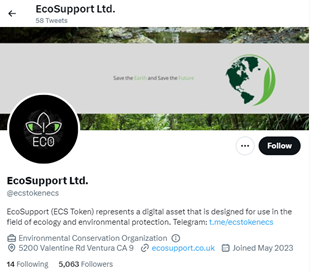Japan targeted by Chinese propaganda and covert online campaign
Posted By Albert Zhang on June 8, 2023 @ 10:00

The Chinese Communist Party is ramping [1] up a multi-year propaganda and covert social media campaign focusing on Japan’s plans to release wastewater from the earthquake-stricken Fukushima Daiichi nuclear power plant. This is happening as a team from the International Atomic Energy Agency visits [2] Japan to complete its final review of the plan.
Chinese diplomats have raised [3] the topic at numerous international forums. Chinese state media outlets have increased [4] their [5] multi-language [6] coverage of the issue, including in articles [7] and social [8] media posts [9] referencing an anonymous ‘insider’ and reporting that South Koreans [10] are opposed [10] to the plan [11]. In the first five months of 2023, Chinese diplomats and state media tweeted about it more than 300 times, already surpassing total mentions in 2022.
ASPI has identified at least 33 inauthentic accounts on Twitter posing as women from Western [12] countries or using anime [13] images as profiles. As a part of this ongoing campaign, these covert social media assets have posted more than 600 tweets calling on Japan not to release the wastewater into the Pacific.
These accounts are likely to be linked to previous CCP covert influence operations [14] on social media. The coordination of covert and overt approaches is typically intended to spread a narrative for a strategic purpose. In April 2022, a similar CCP-linked network posed [15] as foreign citizens to criticise the Quad and Japan’s plans to deploy missiles in Okinawa.
This time, inauthentic accounts are receiving minimal [16] engagement but are part of Beijing’s broader messaging, which is gaining traction. In drawing public attention to Fukushima, the CCP is disregarding other power plants releasing nuclear wastewater, including ones in China. The campaign is threatening Japan’s relationships with its neighbours and imposing an economic cost by delaying [17] demolition of the damaged plant.
These social media accounts started posting about Japan’s plan to release nuclear wastewater as early as April 2022 [18]. Posts often stoked [19] fears about drinking contaminated water (for example, one post reads: ‘Japan decided to discharge contaminated water from the Fukushima nuclear power plant into the Pacific Ocean. The damage is borne by the people of the world. Bad Japanese government.’)
Other posts were more evocative (for example, ‘Originally, l had sympathy for the victims of the Hiroshima nuclear accident in Japan, but Japan actually designed a mascot for the purpose of discharging nuclear wastewater?! Why is it even auspicious for you to discharge nuclear waste into the sea against humanity? ×XX!’). And some, such as those below, were more hyperbolic.
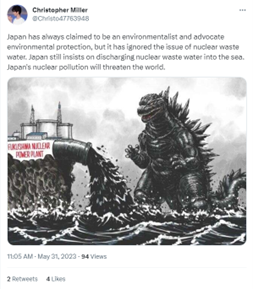 [20]
[20]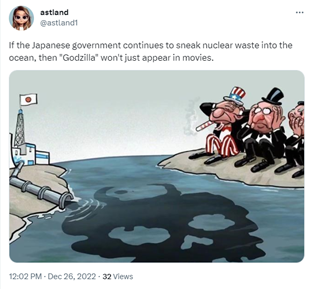 [21]
[21]The handling of these accounts closely matches that of networks that Twitter and Meta have linked to the Chinese government. Accounts [22] have attacked a Chinese businessman, Guo Wengui, and a virologist, Yan Limeng [23], both of whom are common targets of China’s Ministry of Public Security’s influence operations [24] on social media. As with previous iterations [25] of the network harassing and threatening women of Asian descent, nearly 90% of these tweets were posted within Beijing business hours.
Rather than flooding hashtags on Twitter, accounts in the network tend to post phrases criticising the Japanese government—with some combination of ‘Japan’ or ‘Japanese’, ‘nuclear’ and ‘waste’—and describing it as a threat to people or the environment. More than 28% of such posts include a call to action, encouraging everyone to ‘resist such behaviour [26]’.
One Twitter persona stood out as more sophisticated than others. ‘EcoSupport Ltd [28].’ was created in May 2023 and its posts are consistently liked or retweeted by the same [29] few [30] accounts [31]. The account has tweeted the same text [32] posted [33] by other accounts in the CCP-linked network focused on the Japan campaign. EcoSupport Ltd. has copied the identity of a real UK ecological consultancy [34] (see the fake ‘EcoSupport Ltd.’ profile (top) and the real Ecosupport account [35] (bottom) in the images below).
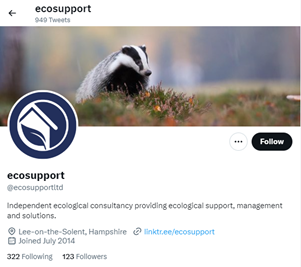 [37]
[37]Unusually, on 5 June, the fake EcoSupport Ltd. account gained more than 5,000 followers despite having no tweets with more than 10 engagements. Manually analysing a sample of recent followers revealed that they all promoted cryptocurrencies, and Twitter has since suspended around 200 accounts.
The fake EcoSupport Ltd. bio links to the real Ecosupport website but promotes a fake cryptocurrency to draw users to a separate Telegram channel. This account may have been created by a commercially motivated actor to build a follower base before being sold or repurposed for pro-CCP propaganda.
The posts in the fake EcoSupport Ltd. Telegram channel were almost all direct copies of the tweets on the fake account’s Twitter timeline, except for one that appears to duplicate a post [38] by the gold-check-marked [39] Twitter account of the UCLG ASPAC Tourism Committee based in China. The ‘committee’ describes itself as a non-profit organisation launched by the Xi’an Municipal People’s Government, but its president is Li Mingyuan [40], a former mayor of Xi’an and current official [41] in multiple United Front [42] agencies.
The exploitation of environmental and health fears is a common tactic in CCP propaganda that seems to resonate with public audiences. In June last year, social media accounts linked to the Chinese state sought to harm [43] the reputation of Australian and North American companies over their rare-earth mining and refinery operations by spreading claims that they posed significant risks to the environment and people’s health.
The CCP also tends to reference the Fukushima disaster and related issues when the bilateral relationship with Japan deteriorates. In April 2021, Zhao Lijian, China’s foreign affairs spokesperson at the time, posted [44] a variation of Hokusai’s painting The Great Wave off Kanagawa that depicted it as a nuclear disaster, prompting Japan to launch a forceful protest [45] to delete it. Japan may have irked the CCP when its diplomatic ‘Blue Book’ called out [46] China’s maritime military activities.
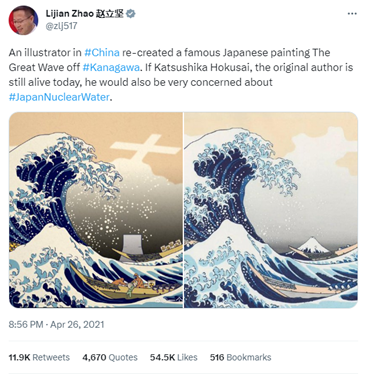
A few months earlier, Zhao posted an image depicting an Australian special forces soldier killing an Afghan child, which caused a similar media sensation [47] in Australia. The Afghan tweet was pinned to Zhao’s Twitter timeline before he replaced it with the Fukushima tweet, indicating that he believed both set international news agendas. Despite Zhao’s reassignment [48] from the foreign ministry’s information department, Fukushima still appears to be a useful trope in CCP propaganda.
In its more recent campaigns, the CCP is likely attempting to deter and disrupt Japan’s increasing engagement with its neighbours and the West. Reports that NATO is discussing [49] establishing an office in Japan are a concern to Beijing strategists, who are also dismayed that Japan is working with the US to strengthen [50] export controls on semiconductor manufacturing equipment to stymie China’s military development. Likewise, renewed engagement [51] between South Korea and Japan was the first bilateral step in over a decade towards overcoming unresolved historical disputes.
By drawing undue attention to Japan’s planned wastewater disposal, the CCP is fuelling tension [52] between Tokyo and numerous governments and civil-society groups in the Indo-Pacific. China [53] and South Korea [54], along with Pacific Islands Forum Secretary-General Henry Puna [55], have previously raised concerns about the wastewater release and suggested Japan consider alternative options.
The power plant operator, Tokyo Electric Power Company (TEPCO), says radiation levels in the water will be too low to harm marine life or people, a conclusion international nuclear experts support [56]. Japan is also working [57] with the International Atomic Energy Agency to meet international safety standards and review the safety of the release. Japan hosted South Korean nuclear experts [58] who toured nuclear facilities at Fukushima.
That’s not to say that there are no risks [59] with nuclear wastewater disposal. But Japan has been transparent with its plans and has opened itself up to international scrutiny and testing. TEPCO is also filtering [60] almost all radionuclides from the wastewater to below international regulatory standards. An exception is tritium [61], an isotope of hydrogen that is difficult to remove from water but occurs naturally in trace amounts.
Other countries are already releasing nuclear wastewater into oceans or steam into the air—including from two nuclear power plants in China. For comparison, the annual amount [62] of radioactive tritium in wastewater that Japan is planning to discharge from Fukushima is half what the Fuqing Nuclear Power Plant in China’s Fujian Province discharged [63] in 2020, and around one-tenth of the 2018 discharge from Canada’s Darlington nuclear power plant.
The CCP continues to spread disinformation through its foreign propaganda system and to conduct covert influence operations [64] on social media because there’s minimal pressure from governments in identifying who is behind these campaigns and a lack of action by some social media platforms to stop coordinated inauthentic behaviour [65]. Public attribution is important to deter these activities, but it also helps civil-society organisations and businesses understand the broader geopolitical context of narratives coopted by nefarious actors.
As ASPI has previously written, the CCP’s increasingly sophisticated [64] efforts to influence global audiences online often target state sovereignty and democratic discourse and support the party’s broader strategic and economic goals. Even covert campaigns that initially appear to have little online engagement are useful tests of which messages the CCP can refine for diplomatic engagements or international forums. Covert campaigns on social media help the CCP gauge public opinion, identify potentially useful proxies and develop strategies to promote its preferred narratives.
While fact-checking can counter some forms of disinformation, studies [66] suggest that that alone won’t change people’s mistaken beliefs. Foreign affairs departments and security and defence agencies in the Indo-Pacific should use social media better to explain their policies to global audiences and challenge problematic narratives before they mislead people. This will require risk-averse government officials to not just counter disinformation head-on but also be more creative and refresh their digital media and public diplomacy strategies to use new tactics such as strategic humour [67] or influencer [68] diplomacy [69].
Article printed from The Strategist: https://aspistrategist.ru
URL to article: /japan-targeted-by-chinese-propaganda-and-covert-online-campaign/
URLs in this post:
[1] ramping: https://twitter.com/logicallyai/status/1661980309234016258?s=46&t=as5dUlaMrZ4F0T600B4-4w
[2] visits: https://apnews.com/article/japan-iaea-fukushima-nuclear-plant-water-release-3e3c295d77203dc3801ce139e6d745be
[3] raised: https://web.archive.org/web/2/http:/www.china.org.cn/world/2023-05/30/content_85875765.htm
[4] increased: https://twitter.com/i/web/status/1661003481346629633
[5] their: https://twitter.com/i/web/status/1660993440786825216
[6] multi-language: https://twitter.com/i/web/status/1661362425952862208
[7] articles: https://twitter.com/globaltimesnews/status/1665683634349809664?s=46&t=as5dUlaMrZ4F0T600B4-4w
[8] social: https://twitter.com/chinaorgcn/status/1665542784286355456?s=20
[9] posts: https://twitter.com/zhang_heqing/status/1662821480194011137?s=20
[10] South Koreans: https://english.news.cn/20230521/41e6aa9089f64bd68787f959a9822fd2/c.html
[11] the plan: https://news.cgtn.com/news/2023-05-30/Over-100-000-South-Koreans-oppose-Japan-s-nuclear-wastewater-release-1kemFvk1KzS/index.html
[12] Western: https://web.archive.org/web/2/https:/twitter.com/StaceyMacP50653
[13] anime: https://web.archive.org/web/2/https:/twitter.com/alimli06113080
[14] CCP covert influence operations: https://www.aspistrategist.ru/report/gaming-public-opinion
[15] posed: /pro-ccp-inauthentic-social-media-accounts-shift-focus-to-the-quad/
[16] minimal: https://web.archive.org/web/2/https:/twitter.com/christo47763948/status/1663713212116914177?s=46&t=as5dUlaMrZ4F0T600B4-4w
[17] delaying: https://www.stuff.co.nz/pou-tiaki/131181451/japan-to-delay-pacific-nuclear-wastewater-discharge
[18] April 2022: https://web.archive.org/web/2/https:/twitter.com/adnar_alim
[19] stoked: https://web.archive.org/web/2/https:/twitter.com/1_drli/status/1651461520038203392
[20] Image: /wp-content/uploads/2023/06/Albert-Pic-1.png
[21] Image: /wp-content/uploads/2023/06/Albert-pic-2.png
[22] Accounts: https://web.archive.org/web/20230601004253/https:/twitter.com/1_drli
[23] Yan Limeng: https://web.archive.org/web/2/https:/twitter.com/Christo47763948
[24] Ministry of Public Security’s influence operations: https://www.justice.gov/opa/pr/40-officers-china-s-national-police-charged-transnational-repression-schemes-targeting-us
[25] iterations: /musks-twitter-takeover-comes-as-the-ccp-steps-up-its-targeting-of-smart-asian-women/
[26] resist such behaviour: https://archive.vn/fG7hF
[27] Accounts: https://web.archive.org/web/2/https:/twitter.com/adnaralim1/status/1517516166528331776
[28] EcoSupport Ltd: https://web.archive.org/web/2/https:/twitter.com/ecstokenecs
[29] same: https://web.archive.org/web/2/https:/twitter.com/JaneSmith_24
[30] few: https://web.archive.org/web/2/https:/twitter.com/hanna91094
[31] accounts: https://web.archive.org/web/2/https:/twitter.com/Charlie_clinto
[32] text: https://web.archive.org/web/20230605050919/https:/twitter.com/ecstokenecs/status/1663885270314352642
[33] posted: https://archive.vn/OdhHp
[34] ecological consultancy: https://ecosupport.co.uk/
[35] Ecosupport account: https://twitter.com/ecosupportltd
[36] Image: /wp-content/uploads/2023/06/Albert-Pic-3.png
[37] Image: /wp-content/uploads/2023/06/Albert-Pic-4.png
[38] post: https://web.archive.org/web/2/https:/twitter.com/uatcnews/status/1660900977694875655
[39] gold-check-marked: https://help.twitter.com/en/rules-and-policies/profile-labels
[40] Li Mingyuan: https://baike.baidu.com/item/%E6%9D%8E%E6%98%8E%E8%BF%9C/7329381
[41] official: https://web.archive.org/web/2/http:/www.zgsxswtzb.gov.cn/mobile/leaderDeatil.html?id=16
[42] United Front: https://www.aspistrategist.ru/report/party-speaks-you
[43] sought to harm: /the-ccps-information-campaign-targeting-rare-earths-and-australian-company-lynas/
[44] posted: https://twitter.com/zlj517/status/1386635238986510341
[45] forceful protest: https://www.reuters.com/world/asia-pacific/china-says-japan-should-apologise-fukushima-water-plan-2021-04-28/
[46] called out: https://www.asahi.com/ajw/articles/14339423
[47] sensation: https://www.abc.net.au/news/2020-11-30/china-fake-image-australian-war-crimes-afghanistan-tensions/12934538
[48] reassignment: https://foreignpolicy.com/2023/01/11/china-wolf-warrior-zhao-lijian-diplomacy/
[49] discussing: https://asia.nikkei.com/Politics/International-relations/Indo-Pacific/NATO-to-open-Japan-office-deepening-Indo-Pacific-engagement
[50] strengthen: https://www.japantimes.co.jp/news/2023/05/22/business/semiconductor-exports-china/
[51] renewed engagement: https://www.usip.org/publications/2023/03/whats-behind-japan-and-south-koreas-latest-attempt-mend-ties
[52] tension: https://thediplomat.com/2023/05/planned-fukushima-water-release-adds-a-new-wrinkle-to-japan-south-korea-ties/?utm_source=substack&utm_medium=email
[53] China: https://apnews.com/article/china-japan-fukushima-radioactive-water-release-885448891995b87e661b418c69c7ebfe
[54] South Korea: https://www.aljazeera.com/news/2021/4/14/s-korea-aims-to-fight-japans-fukushima-decision-at-tribunal
[55] Henry Puna: https://www.theguardian.com/commentisfree/2023/jan/04/japan-must-work-with-the-pacific-to-find-a-solution-to-the-fukushima-water-release-issue-otherwise-we-face-disaster
[56] support: https://theconversation.com/no-the-fukushima-water-release-is-not-going-to-kill-the-pacific-ocean-200902
[57] working: https://www.iaea.org/newscenter/pressreleases/iaea-issues-new-report-on-safety-of-japans-plan-to-discharge-alps-treated-water-from-fukushima-daiichi-site
[58] South Korean nuclear experts: https://asia.nikkei.com/Politics/Japan-South-Korea-ties/Fukushima-inspection-team-returns-to-South-Korea-after-assessment
[59] risks: https://www.science.org/content/article/despite-opposition-japan-may-soon-dump-fukushima-wastewater-pacific
[60] filtering: https://www.newscientist.com/article/2359217-fukushima-the-inside-story-of-the-alps-treated-water/
[61] tritium: https://www.energy.gov/science/doe-explainsdeuterium-tritium-fusion-reactor-fuel
[62] amount: https://www.reuters.com/plus/the-science-and-global-standards-behind-fukushimas-alps-treated-water
[63] discharged: https://www.meti.go.jp/english/earthquake/nuclear/decommissioning/pdf/202104_bp_breifing.pdf
[64] covert influence operations: /ccps-increasingly-sophisticated-cyber-enabled-influence-operation/
[65] coordinated inauthentic behaviour: https://about.fb.com/news/tag/coordinated-inauthentic-behavior/
[66] studies: https://akademie.dw.com/en/is-fact-checking-effective-a-critical-review-of-what-works-and-what-doesnt/a-55248257
[67] strategic humour: https://journals.sagepub.com/doi/full/10.1177/13691481211023958
[68] influencer: https://journals.sagepub.com/doi/full/10.1177/2056305120981053
[69] diplomacy: https://www.globalpolicyjournal.com/blog/28/03/2023/first-tiktok-war-lessons-diplomacy-tiktokkers-frontlines
Click here to print.
